etoile rewiring my brain
now that i’m out of school i can now return to the truest form of scholarship: several thousand word articles about television i like! this is kind of a monster piece because i realized that a lot of the things i want to review/write about can be connected by this umbrella idea of what is and is not considered prestige tv, so here’s a table of contents for your convenience. i respect it if you’re only here to read about one thing :-)
- lets talk about mediocre television
- adolescence was bad because it knew it would be well received
- i have become obsessed with a show about ballet
- etoile review
- cheyenne and tobias as mirrors of one another
- show billed as queer has no queer women
- i love reticent guardians of weird children
lets talk about mediocre television
i’ve been a true lover of many mediocre tv shows. shows that have been deemed not very good but still maintain some charm to me, or redeem themselves by being enjoyable despite the objectively poor quality of their construction. these shows, i will argue, are imperative for the greater ecosystem of television because they allow for information about what makes tv enjoyable vs what makes tv “good” to be derived from them. as opposed to “good” or “prestige” tv that falls flat despite the obvious indicators that it should be doing well. prestige as a category applied to television is something i struggle with–it’s such an abstract term but i’ve generally come to understand it as television that has a big budget and receives critical acclaim (or some mixture of these and other things). wikipedia defines the beginning of this golden age of prestige shows through three elements:
first, an improvement in both visual aesthetics and storytelling; second, an overall homogeneity between cable series and networks series; and third, a tremendous popular success
i think that on the spectrum of “good” and “bad” tv, the good section has expanded considerably due to the access that most studios have to the resources to elevate their works. sure, there definitely are bad shows, that are both poorly written and acted (cough overcompensating (2025) (ironic title) cough), but i think they’re a minority if we’re separating shows out based on how enjoyable they are. of course, these are two different ways to classify tv shows but the point i’m trying to make is that i think there’s something to be said for the enjoyability of tv to be factored into whether they’re considered good or bad. but i digress. as an example, i want to talk about one of my favorite shows that is definitely not what most people would consider to be good tv and why exactly this is important.
in early 2022 i stumbled upon diary of future president (2020-2021), a disney show that follows fictional president elena cañero-reed’s middle school years, the point in her life that led her to realize her passion for politics. it’s exactly as corny as you might imagine, and its also clearly written for preteen girls, which i thought was awesome. i was not a preteen girl when i watched it but i don’t think that this target demo should knock points off of its reception because i don’t actually think preteen girls have very many shows tailored towards them. at least this is what i was finding when i was doing my usual scouring of the internet for information about the show. i’d watched it just a few months after it got canceled, and when i found out it was like a bomb hit my household. i don’t think i stopped crying it about for weeks. now, the construction of the show is at best… tolerable. it’s always a crapshoot with true-to-age actors (i.e. child/teen actors) and since its aimed towards a younger demographic, the writing is earnestly trite and occasionally unforgivably corny, but i still fell in love with it. i was also studying to get my pilot’s license at the time (which i did not end up getting) and i vividly remember sitting in our library listening to the audiobook version of the pilot’s handbook of aeronautical knowledge (or PHACK) while drawing fanart that would go on to be reposted by the creator of the show (my proudest moment).
all to say, diary of a future president was middling, but it had an unmistakable charm. i realized later that it fell into several demographics that are generally pushed aside: shows written with preteen girls in mind and television about latinos. i couldn’t find any stats for television written and marketed for preteen girls so the evidence will remain anecdotal for the time being, but there are very certain, disappointing statistics about latino representation in hollywood.1 ultimately, the fact that it wasn’t great wasn’t its downfall and in fact probably helped it in the long run. prestige shows can feel self-absorbed and you might begin to have a sense that they believe they deserve more praise than what their series is actually offering. i never had this issue with diary and i wish it had gotten a shot at running longer for many reasons. this brings me to my next point though:
adolescence was bad because it knew it would be well received
my most discussed review yet… i wasn’t going to keep writing about this show but i realized that it would fall neatly under my current topic and that i could make an example of it as a result. if you haven’t seen my review of adolescence (2025), i can sum it up by saying here that i was deeply underwhelmed. this show struck me (after thinking about it for a bit) as the worst case scenario for “prestige” television. i refer to it as a mediocre piece of art in my review but that actually isn’t the extent of it. the problem with the show (aside from it being way too long, not gripping enough, etc etc) is that it takes itself way too seriously. you can tell watching it that the people who made it knew that it would do well because, again, of the salience of the subject. there’s a feverishly compulsive tilt to the way that people talk about the “manosphere” and how it has infiltrated our lives in various ways. it’s an important thing to discuss, i’m not negating that, but i think that because it’s such a big deal right now there was a bit of arrogance in the construction of the show. there are very few themes a show could tackle that would make me watch like thirty minutes of three characters in a car. and this is not one of them. but whoever was involved in the making of that episode certainly thought that it would.
i don’t think that adolescence was bad through and through, but it also wasn’t enjoyable or interesting for me to watch at all. i didn’t care, it was boring. the framing of the story was off, the pacing was off, and all of these issues, in my opinion, could probably be be traced back to the fact that the writers knew that because their show would become part of our cultural zeitgeist, they were allowed to mosey the story along however they pleased. WRONG! there will always be one guy online there to complain and today that guy is me. sometimes shows just need to take themselves less seriously, be more earnest in their storytelling and less sure that whatever they write will be lauded. i want creators making media about pertinent issues to care deeply about how their works are received and how they will add to the conversation. a poorly written expose about the dangers of big tech and a meandering, shallow show about the manosphere do not meet these expectations.
i have become obsessed with a show about ballet2
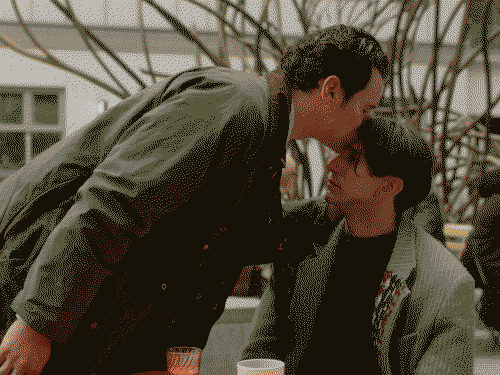
now, if i were to compose a letter to jonathan groff of spring awakening fame, it would go something like this:
dear mr groff
thank you for all that you've brought to my life in the last year. i have watched merrily we roll along many times. your franklin shepard is stupendous, i’d love to punch him in the face. through some fluke of instagram marketing your delightful presence graced my screen in the form of an ad for etoile. i’m sorry to say that this ad worked on me (we’ve all been there), and although you only make a cameo in the seventh episode of the season for a paltry three minutes, i’d be hard pressed to not to credit you for my recent watch of and obsession with the show.
my most sincere regards, maybe someday ill watch glee,
bon from bondiaries fame
let me begin this review by saying: i loved this show on so many levels but first and foremost because it was so full of heart. endearment truly does rule my life! so silly and absolutely did not take itself seriously at all. it was also trying to do so much, which i think is commendable but in this case did backfire just a tiny bit. for the most part they did manage to write all the plots to fruition at the cost of a bit of disjointedness and some ostensibly irrelevant narratives but we’ll get to that later. all in all, it was a pretty good show. it's also what led me to my thesis that mediocre non-prestige shows matter too because of this review on seralizd for the show that begins by saying:
Man, fuck prestige TV, man. Idgaf, I really don't, lmao. This is what I want. I want a fun, engaging, entertaining TV show that just does not try too hard.
this left me thinking. tv shows can really try way too hard and end up shooting themselves in the foot. lets have fun! cringe culture is dead? prove it. and that’s exactly what etoile does. the show itself is mostly character-driven and thankfully stacked with a charming and eccentric ensemble, most notably: jack mcmillan, fastidious and obsessed with his own death at 45 years old (i giggled), genevieve lavigne, who’s always taking her heels off, cheyenne toussaint who makes everyone deeply angry, tobias bell who also makes everyone deeply angry (both of them quite talented in their own rights), mishi duplessis, a downtrodden prodigy (my dearly beloved), and gabin lastnamenotgiven, similarly talented but who’s constantly having diva meltdowns. you may read this list and go “woah! thats a lot of characters” at which i laugh because that’s just a list of the most important ones, but there are others who literally still get their own scenes somehow. looking at you gael.
etoile review
untagged spoilers for the show from here on out! both the strength and the weakness of this show is how committed it is to telling every character’s individual story. the hour long tv show episodes truly test me but i don’t think that etoile could’ve gotten away with many of its plotlines if not for the extended length format. some of them did truly drag for me, especially gael’s little whatever arc he has and a few plots/themes/behaviors also seemed to be abandoned partially–i suspect because it simply wasn’t sustainable to continue them. this was especially prominent with cheyenne’s environmentalism which i wish had been brought up in the finale (it seemed like such an important part of her character, why not at least mention it?), and what about jack’s family literally suing him? scared dog reaction. oh well. we can’t have it all). other than the fact that there were just so. many. aspects to this show, i think it was truly brilliant. the acting was delightful and only occasionally overwrought, the writing was witty and quick, the characters well-established, the relationships interesting (although i take issue with the amount of straight romances. jesus christ), and most importantly it was incredibly enjoyable to watch.
cheyenne and tobias as mirrors of one another
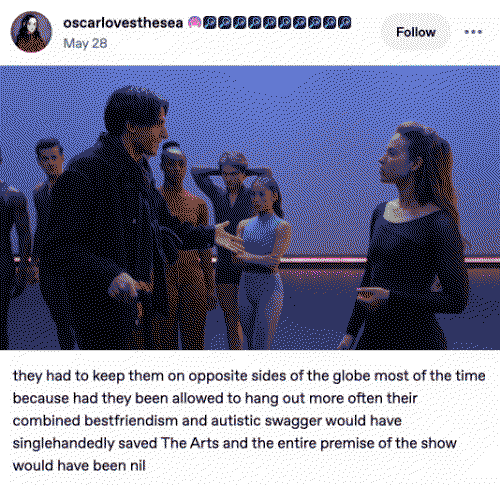
one of my favorite character dynamics on the show is between two characters who only interact once. tobias is almost textually autistic (my main evidence being gabin’s monologue about standing loyally with him–please no one eat anything that smells like peanuts or bbq for his sanity), and on top of that he has his little headphones and his savant stereotypism which we have yet to pry from tv writers’ hands. he moves through the world of étoile in a sort of neurotic, alarming way, confusing and irritating almost every other person he interacts with, and because he is considered such a genius at choreography, his demanding and difficult personality is generally tolerated. while not as explicitly autistic coded as tobias (she does not have headphones glued to her like he does), cheyenne has almost the exact same traits superimposed onto a scary french girl instead of a sad looking new yorker. she is uncompromising and demanding, extremely good at what she does, terrifies and baffles everyone around her, and is similarly tolerated because of her skills. what i most enjoy about these two parallel characters is that neither are treated better or worse than the other. their behavior is tolerated but complained about bitterly, and both of them get their way. it feels so rare that there are female characters who are autistic coded and lowkey a nightmare to be around and are still treated like sympathetic people instead of villains.
where cheyenne and tobias deviate in their parallelisms is how they connect with people, or at least how they deal with relationships. by the end of the season, cheyenne comes to the conclusion that she is broken or hollow or inhuman of some kind because she was dumped by gael after his absurd arc with nick’s sister. i truly did not care enough about their relationship to be affected by this event but looking at it through the frame of cheyenne’s autistic behavior throughout the show makes it far more interesting than their tepid fling could have ever been. she’s essentially staked her identity on the one thing that she’s exceptional at (ballet) and doesn’t expect to ever be understood after gael tells her that she loves her art, and that there’s no room in her heart for anyone else. this of course is topped off by another romance that to be honest i thought was stupid and didn’t see coming. i would have preferred her to be reassured of her worth outside of dance in a different way (there’s something to be said for friendship!) but no, it had to be another fling. i feel like i’m going crazy. does romance really have to save everyone all the time. whatever.
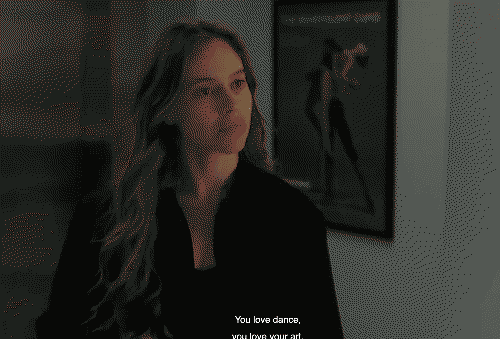
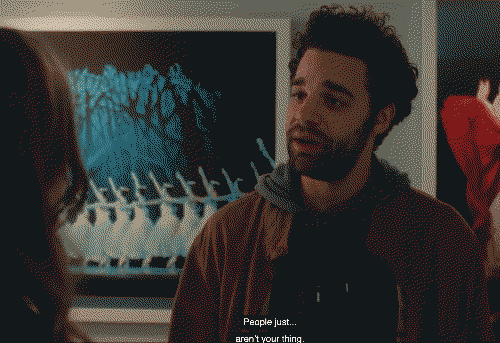
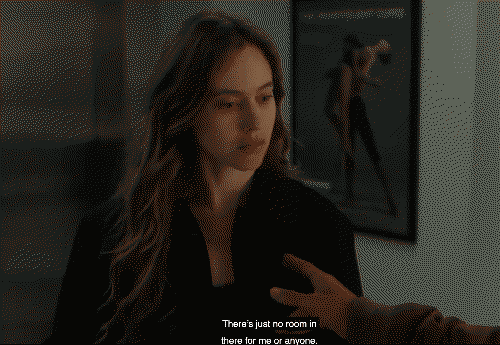
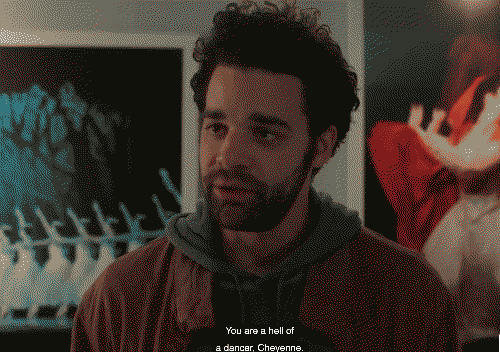
text reads: "you love dance, you love your art. people just... aren't your thing. there's no room there for me or anyone. you are a hell of a dancer, cheyenne."
in contrast to cheyenne’s desperation for connection, tobias ends the season suddenly more connected than he’s ever been before. he has the one thing that cheyenne does not, which is someone to stand by him even when he’s being difficult and unreasonable because of the way he approaches his art. gael abandons cheyenne because of her dedication and (perceived) inability to shift her focus from dance whereas gabin dedicates himself to helping tobias create choreography he is proud of and understanding his headstrong commitment to his art. gael is uninteresting to me as a character but the ways that he functions to help us understand cheyenne is fascinating. the ways they engage with their art are also in opposition with each other. the final tobias scene is making ballet less pretentious and self-serious, more communal and funny. he is sharing the process of making art with people who aren’t part of the community. he is connecting by being himself. cheyenne is more closed off, dancing to a song that’s literally called “i married myself” and discusses how happy one can be in isolation. she does not invite anyone else to be part of the experience, it is just her on stage and then she leaves. fascinating.
although i did not care for him, my mother did end up liking gael. i watch most of my tv either with or alongside her (read: i force her to watch shows i think are good) and it was interesting how divergent our reactions were to this show; i found gael insufferable and boring, only there as fodder for cheyenne and not introduced early enough for me to care. my mother enjoyed his character because she likes an adventurous spirit and she thought his arc wrt his relationship with ballet was well structured. i enjoy watching television with her because as much as i hate it when people don’t agree with me about tv, she offers refreshing new positions on shows i watch with blinders on essentially. there is value in stories that even i don’t personally find engaging. in any case, gael is an interesting device whether or not the way his character is written is good.
show billed as queer has no queer women
technically it wasn’t explicitly referred to as “queer” on any of the articles that i read about the show after finishing it, serialized did add it as a nanogenre which may have been where this confusion began. going into it i expected that there might be more diversity in the romances (ie there might be. multiple queer couples), and i’m no scholar of queer media by any means, but one thing that did strike me was the lack of female queer representation in this show. i was troubled by the implications of this–even with a stacked female cast and boundless opportunities, every single woman on the show was saddled with a straight romance. even the eccentric older woman–cheyenne’s mother and mishi’s adoptive guardian–has her “monday night man,” a man who we are never introduced to but who is referenced multiple times throughout the show. for what purpose? we’ll never know. presumably to reinforce the straightness of a woman who is weird and masculine enough that it might’ve come into question. how irritating.
of course i appreciate the representation that was included, tobias and gabin were written compellingly and were well fleshed out and neither of them fell prey to the trappings of trope (aside from tobias’s purported savantism). but i feel like there’s still a hint of stereotype in the fact that they were the only queer couple in the show. it seems like there is still some tacit rule that men are allowed to be queer in female fields (perhaps even expected to be so because they are engaging in a typically “feminine” art form) whereas women are not. again, take this all with a grain of salt, this is just something i started thinking about because it felt like there was so much opportunity for at least one of the women to have a female love interest but it was somehow impressively straight, with all four principal women paired with men. i’m also specifically cranky about this because it feels like there is just generally dearth of queer female characters on television. this can be chalked up to any number of reasons but needless to say it’s one aspect of tv i am consistently disappointed by. for this show in particular is felt like a missed opportunity, especially with such an array of characters and stories! i would have liked cheyenne to hire a hitman for gael because what do you mean you dumped her for your boss’s sister who’s also your ex lol?
mishi’s romance grated in particular because for some reason there was an entire subplot to do with her mother’s neglect, characterized in particular by mishi’s inability to talk to boys/kids her age because she was never allowed to interact with nondancers, and her mother referencing not knowing if she’s straight. the fact that it was brought up several times made me think she might get a less typical romance arc, but what i realized is that if she had been given a female love interest, there would’ve had to have been some sort of explanation and the story would have shifted from ballet to a coming-of-age coming out story. tobias and gabin required no explanation because, well, read above. but i think a queer mishi would have broken the implicit rule of her femininity as a ballerina. maybe if one of the older women had been given this opportunity it would’ve been a nonissue and life would go on as usual, but i don’t think this would not have been the case. then again, who can even say because none of them were given the opportunity.
i love reticent guardians of weird children
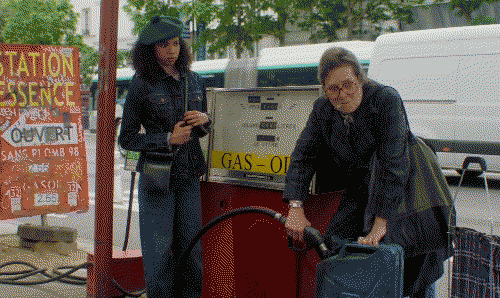
all my complaints about mishi's romance aside, i love her and bruna dearly, i wish them all the best. mishi was one of my most favorites. she struggles very similarly to cheyenne, in that she craves connection with people outside of her very insular dance world but can’t seem to hack it. despite being a nationally beloved ballet prodigy and the daughter of the minister of culture, she is deeply lonely; universally hated at the ballet institute, out of place and uncomfortable with kids her own age, ripped from her friends in new york with no say. when she does manage to secure a date with the boy she likes, she realizes she knows so little about the world outside of dance that she has to google the city she lived in for two years to clandestinely memorize facts from wikipedia and awkwardly regurgitate them as an attempt to fit in. when i say i felt that in my soul…. of course, i am a certified sucker for reticent parent/adopted child storylines so mishi and bruna have a special place in my heart. while her bids for connection with kids her age fail, bruna becomes her stand-in caretaker and friend. i thought it was such a lovely story and relationship. also, mishi has the cutest outfits & i love her princess bed & her little dog so of course i am completely enamoured with her. dear mishi!
there is so much more i could say about this show and i’ll probably come back to it at some point. i actually had a dream about season 2, which mostly consisted of cheyenne pacing through my mind like a rabid dog (love her). i am very excited to see where things go from here, and i’m grateful i saw jonathan groff and decided to give the show a shot :) i have more to say about mishi as well so we'll probably see a mishicentric page here at some point #my best friend mishi. thanks for reading ^_^ let me know your thoughts
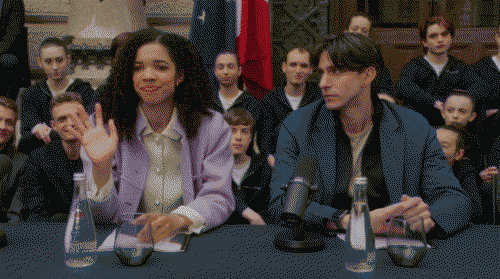
1^
new report calls out u.s. media for lack of latino representation /
mainstream hollywood damages its profit potential by largely ignoring latinx stories and audiences
2^and i don't even understand dance as an art